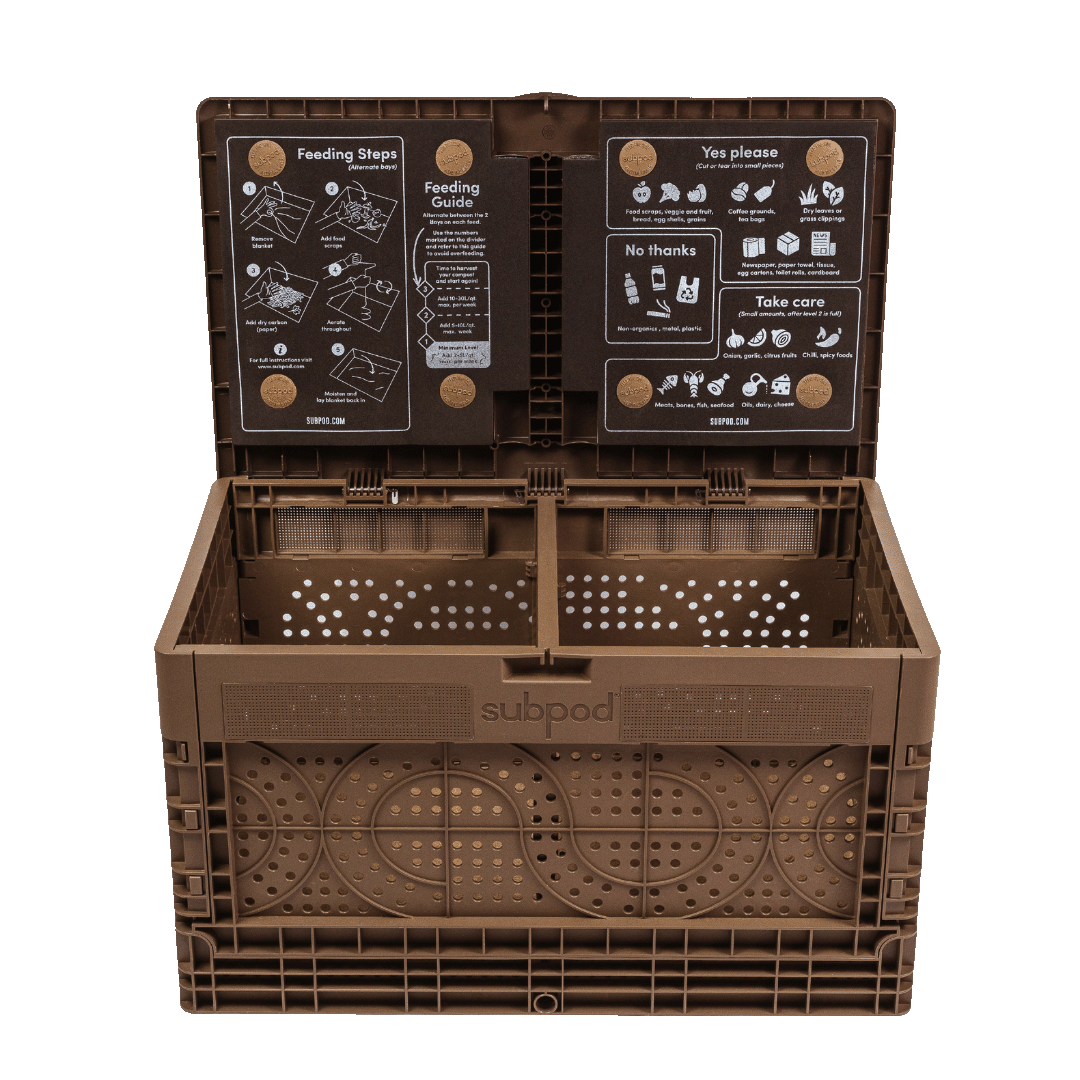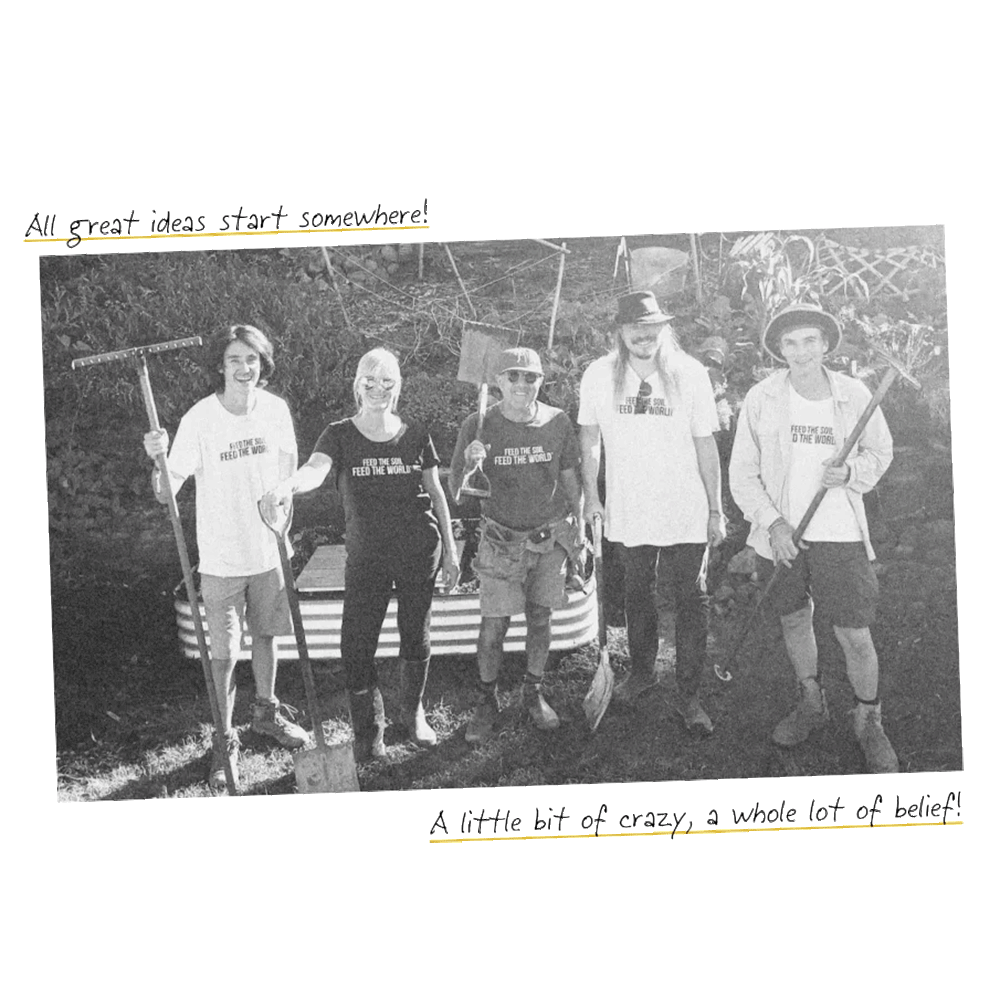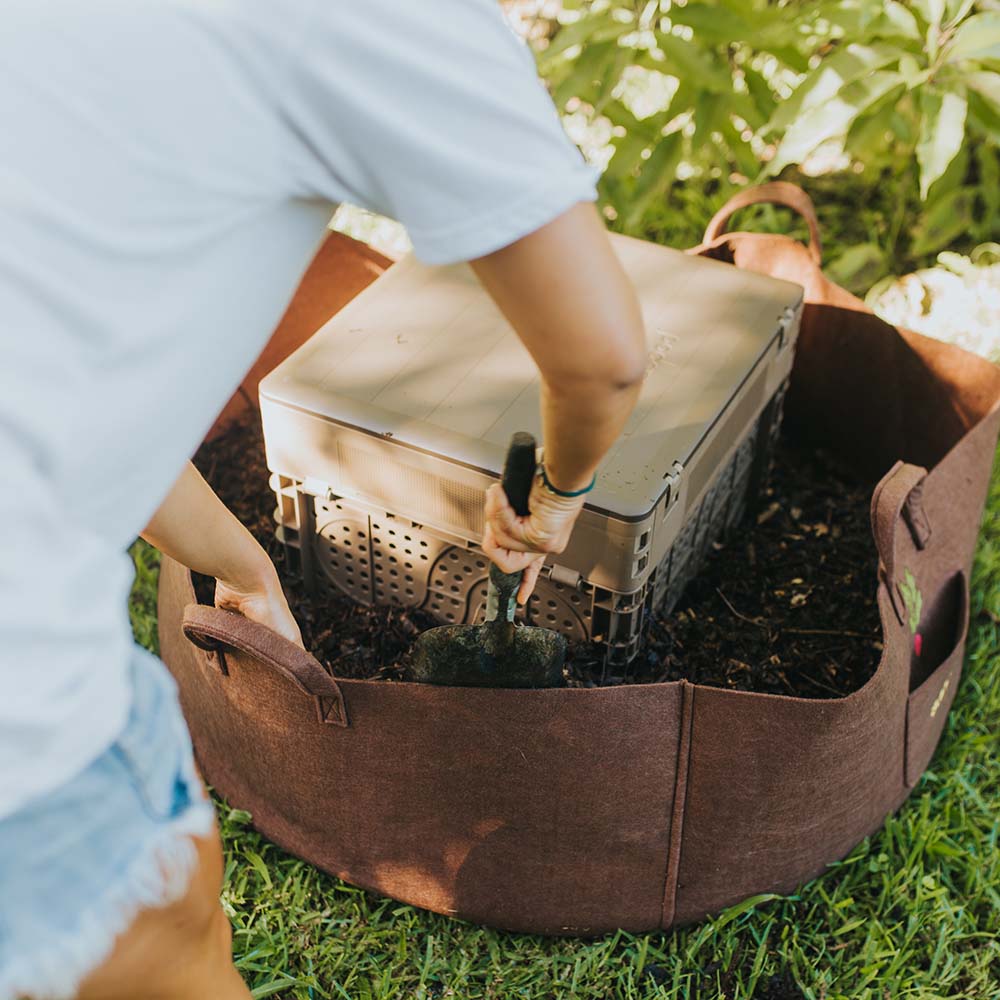What can you Compost: Full List of Compost Materials
Knowing what to put into compost bin may be very challenging. Many things can be composted, including vegetable and fruit scraps, eggshells, tea bags, coffee grounds and almost everything that comes out from your kitchen.
But we shouldn’t forget about the importance of non-organic waste that can be a great addition to your compost like yard waste, leaves, grass clippings, or paper products like newspaper and cardboard.
However, it is important to be attentive while composting meat, dairy, and oily foods, as these can attract pests and slow down the composting process or even damage the whole compost pile.
Check the list below where you can find all composting materials classified as green or brown materials and important notes for you to choose correct ingredients for successful composting.
| Ingredient | Can you compost it? | Green or Brown? | Notes | Subpod compatible |
|---|---|---|---|---|
| Ashes | Yes | Brown | A good source of potash (potassium-nitrate). Best added in layers because it washes away easily. Too much will make your soil too alkaline, so add sparingly. | sparingly and mix in water first |
| Avocado Pits | Yes | Brown | Avocado pits are compostable and provide carbon-rich nutrients to the compost as ‘brown materials.’ | slow to break down and will need to be fished out later when compost is harvested |
| Bamboo | Yes | Brown | Bamboo is biodegradable and 100% compostable within 2–6 months. | not suitable - too slow to break down |
| Banana Peels | Yes | Green | Banana peels provide calcium, magnesium, potassium, and sodium to your garden soil. | Yes |
| Biosolids | Yes | Neutral | Composting biosolids can help stabilize and treat the soil as they contain nutrients and organic matter that can be beneficial for plant growth. | if these biosolids are fecal in origin, pose a potential sanitary issue |
| Bones | Maybe | Green | Bones decompose very very slowly. Not worth putting in compost. Small chicken bones are the exception - they decompose slowly but are a good source of nutrients | no just accumulate |
| Bread | Yes | Brown | Bread can be composted when broken into small pieces. Wetting the bread prevents mould. | yes, and soak in water before adding for faster breakdown |
| Cardboard | Yes | Brown | Composting cardboard is a practice that is becoming more popular now | tear into small pieces and wet it first |
| Cat Litter | No | Green | Clay-based cat litter should not be composted due to its slow decomposition and harmful chemicals. However, natural materials like wood shavings, sawdust, or paper can be composted. Keep the compost away from plants intended for human consumption. | potential sanitary issue if the compost is used to grow food |
| Cheese | Yes | Green | Including blue cheese, shredded cheese also cottage cheese. | Yes |
| Cherry Pits | Yes | Brown | Cherry pits are a form of plant matter and can be safely composted | will accumulate without breaking down in the timeframe of compost harvesting |
| Citrus/Orange | Yes | Green | Yes, citrus fruit and peels can be composted. However, it's important to add them to the compost pile in moderation, as they are acidic and can slow down the composting process if added in large quantities. | best to cut into small pieces and only in small amounts and add more when the first ones have broken down |
| Clam Shells | Yes | Brown | Clam shells can be composted, but they may take a long time to decompose due to their hard and durable structure. | no, will just accumulate |
| Coffee grounds | Yes | Green | Coffee grounds nourish compost microbes and speed up the decomposition process. However, adding too many coffee grounds to the compost pile can create a wet, dense pile that's hard to aerate and can slow down the composting process. | small amounts are fine mixed with food, large amounts will overheat the compost |
| Coffee Filters | Yes | Brown | Coffee filters made from unbleached paper can be composted. They provides the energy and structure that compost microbes need to break down organic matter. | yes |
| Cooking Oil | Maybe | Brown | To compost cooking oil, it's better to mix it with other brown and green materials like leaves, straw, vegetable scraps, or grass clippings when composting. This balances the carbon-to-nitrogen ratio. | small amount, such as one cup or so mixed with food scraps is fine |
| Corn Cobs | Yes | Brown | Corn cobs can take longer to break down than other brown materials such as dried leaves or straw. To speed up the decomposition process, it's recommended to chop them into smaller pieces | will accumulate without breaking down in the timeframe of compost harvesting |
| Cotton Burr | Yes | Brown | Cotton burrs are a superior food source for beneficial soil organisms | Will accumulate without breaking down in the timeframe of compost harvesting |
| Cow Manure | Yes | Green | Let the cow manure dry before adding, and be sure to mix it with carbon. Fresh cow manure may contain seeds that will sprout.. | cow manure is fine to add, once the patities are no longer liquid |
| Diapers | No | N/A | Traditional disposable diapers cannot be composted due to synthetic materials and harmful chemicals. Some new plant-based disposable diaper brands claim to be compostable, but it's important to check their composting instructions. | avoid synthetics. again potential issue with sanitation as worm composting is cool temperature composting and may not kill pathogens in fecal material |
| Dog Poop | Yes | Green | Dog waste compost can be used as a soil additive for revegetation, lawn establishment, and planting beds. Keep it away from plants intended for human consumption. | potential sanitary issue if the compost is used to grow food |
| Dryer Lint | Yes | Brown | Adding dryer lint to a compost pile is one of the most common ways to recycle it. | yes, but if synthetics were dried, could have microplastics |
| Egg Cartons | Yes | Brown | They break down quickly and will help create rich fertilizer for your garden | yes tear up first |
| Egg Shells | Yes | Neutral | Contains about 95% calcium, which could be a useful amendment for plants. | yes crush first |
| Eggs | Yes | Green | As long as it is properly prepared citrus can be finely composted | eggs are fine, break open and crush shells |
| Fish | Yes | Green | Fish can be composted, but it's important to do it correctly to avoid attracting pests and creating unpleasant odors. | small amounts , buried well into the compost to avoid attracting pests |
| Flour | Yes | Brown | Note that adding large amounts of flour to a compost pile can create a dense, compacted layer that is difficult for air and moisture to penetrate, which can slow down the composting process. | add water to make a slurry, mix well through the bedding may generate mold that can be broken up and stirred back into the compost |
| Flowers | Yes | Green | Note that some flowers, such as those treated with pesticides or herbicides, may contain chemicals that can be harmful to the environment. | avoid the tough woody stems that will not break down quickly |
| Fruit | Yes | Green | Fruits can be composted, whether it's organic or inorganic. There's even evidence some microbes make pesticides used on fruit inert. | yes, but avoid the pits that will accumulate |
| Grass | Yes | Green | Grass clippings have a very high nitrogen content. Be sure to layer them finely and add carbon. | yes, but let them dry to the brown stage first |
| Hair | Yes | Brown | Human hair and pet hair can both be composted, but it's important to add them in small amounts and mix them well with other composting materials to avoid clumping. | yes, and yes to mixed in small amounts to avoid clumps |
| Hay | Yes | Brown | Note that hay may contain weed seeds, so it's recommended to use caution when composting it. | no, better as a garden mulch than addition to Subpod |
| Horse Manure | Yes | Green | Horse manure should be aged or composted before use in the garden, as fresh manure can contain high levels of ammonia that can be harmful to plants. | It's fine as long a de-worming agents haven't been given to the horses - these are active in the manure and will kill compost worms |
| Human Waste | Maybe | Neutral | It's important to note that humanure composting should only be done with appropriate safety precautions and guidelines in place. | yes to safety guidelines, if used on crops for consumption |
| Leaves | Yes | Brown | It's recommended to shred them into smaller pieces to speed up the composting process and make them easier to mix with other materials. | let dry fully and keep moist so partially rotted down before adding |
| Lobster Shells | Yes | Brown | Lobster shells are very tough and can take a long time to break down, so it's recommended to crush or grind them into smaller pieces before adding them to the compost pile. | Will accumulate without breaking down in the timeframe of compost harvesting |
| Meat | Yes | Green | Composting meat isn't for beginners, but it can be done. Just make sure the amounts are very small and guidelines are followed. | small amounts is ok |
| Milk | No | N/A | Milk is not recommended to be composted. It can create odor and attract pests, and if it is not properly composted, it can even be harmful. | small amounts is fine |
| Mussel Shells | Yes | Brown | Since mussel shells can take a long time to break down completely, they may be better suited for use as a soil amendment rather than a primary ingredient in the compost pile. | Will accumulate without breaking down in the timeframe of compost harvesting |
| Newspaper | Yes | Brown | You should avoid using newspaper with colored ink or glossy coatings, as these may contain harmful chemicals. | yes to guidance noted on no colored inks or glossy coatings |
| Nut Shells | Yes | Brown | Yes, but some types of nut shells, such as those from black walnuts, may contain compounds that can be harmful | Will accumulate without breaking down in the timeframe of compost harvesting |
| Nuts | Yes | Brown | It's important to make sure that they are free of any added oils or salt, as these can slow down the composting process or attract unwanted pests. | chopped is fine |
| Onions | Yes | Green | Onions and other alliums (such as garlic and shallots) contain sulfur, which can be a deterrent to some composting microbes and may slow down the decomposition process. | chopped and small quantities are fine |
| Oyster Shells | Yes | Brown | Note that oyster shells may contain heavy metals or other contaminants, so it's recommended to avoid using them for composting if they were obtained from contaminated waters or areas. | Will accumulate without breaking down in the timeframe of compost harvesting |
| Packaging | Maybe | N/A | Some types of packaging, such as cardboard, paper, and some plant-based plastics, can be composted. However, other types of packaging, such as most conventional plastics, cannot be composted and can actually contaminate the compost pile. | only biodegradable, paper based |
| Paper | Yes | Brown | avoid adding glossy or coated papers, as these may contain harmful chemicals. | avoid glossy and colored inks |
| Paper Plates | Yes | Brown | Some paper plates are coated with plastic or wax to make them more durable and water-resistant, and these coatings may not be compostable. | tear up into small pieces, wax coatings are fine, but no plastic coatings |
| Paper Towels | Yes | Brown | If they are made from 100% natural and unbleached materials yes, however, paper towels that are heavily soiled with chemicals, oils, or food waste should be avoided. | yes and soiled are fine unless contain cleaning or strong chemicals |
| Pasta | Yes | Green | Pasta is made from organic materials like wheat, water, and sometimes eggs. These materials can be broken down by compost microbes. | chopped and distributed is a rich food, may need to come back and spread around any mold that develops |
| Peanut Shells | Yes | Brown | They break down slowly because they are high in lignin, a structural component in plant cell walls that is resistant to decomposition. To speed up the decomposition process it is best to crush or grind the peanut shells into smaller pieces. | Will accumulate without breaking down in the timeframe of compost harvesting |
| Pencil Shavings | Yes | Brown | They are made of wood and graphite, which are both biodegradable and can break down in a compost pile. However, it's best to avoid composting pencil shavings that have been mixed with lead, such as those from colored pencils, as the lead can be toxic to plants and animals. | Will accumulate without breaking down in the timeframe of compost harvesting |
| Pickles | Yes | N/A | Adding too many pickles to the compost pile can throw off the pH balance and make the compost too acidic for beneficial microorganisms to thrive. | small amount chopped up is fine |
| Pine Needles | Yes | Brown | Pine needles can be composted, but they are acidic and can take a long time to decompose. | Will accumulate without breaking down in the timeframe of compost harvesting |
| Pineapple | Yes | Green | Pineapple also a high water content, so it's important to balance it with dry materials, such as shredded paper or dry leaves, to avoid creating a wet and smelly compost pile. | chop up well first |
| Pistachio shells | Yes | Brown | Pistachio shells take a long time to decompose, so it's best to chop or grind them into smaller pieces before adding them to the compost pile. | Will accumulate without breaking down in the timeframe of compost harvesting |
| Pizza Box | Maybe | Green | If the pizza box is made of plain cardboard and doesn't have any grease or food residue on it, then it can be composted. However, if the pizza box is made of coated or glossy cardboard, or if it has food residue, cheese, or grease on it, then it should not be composted. | need to tear into small pieces first and wet these.avoid with glossy coatings or plastic liner |
| Popcorn | Yes | Green | Avoid adding butter, salt, or any other flavorings to the popcorn before adding it to the compost pile | avoid salty popcorn |
| Potato | Yes | Green | Avoid adding cooked or processed potatoes, such as french fries or potato chips. Also look out for diseased potatoes, as the harmfur bacteria can spread throughout your whole garden. | small amounts of cooked is fine, but avoid salted or raw diseased potatos |
| Rice | Yes | Green | Rice should be stored in a dry place before adding to compost. Additionaly avoid adding cooked or processed rice, such as rice that has been seasoned or mixed with sauces, as these may contain oils and additives that can attract pests. | cooked is fine and breaks down faster than raw |
| Sawdust | Yes | Brown | Avoid adding sawdust from treated wood, as it may contain chemicals that can harm the microorganisms in the compost pile | yes if from non chemically treated wood |
| Seaweed | Yes | Green | It's important to rinse the seaweed thoroughly with fresh water before adding it to the compost pile to remove any excess salt. | rinse the salt off first, hight salt is hard on worms |
| Shredded paper | Yes | Brown | It's important to use only unbleached or soy-based ink paper, as bleached paper may contain harmful chemicals that can harm the microorganisms in the compost pile | mix into food or worm bedding to avoid generating clumps. |
| Shrimp shells | Yes | Green | They can be slow to break down, so it's a good idea to chop them into smaller pieces before adding them to the compost pile to speed up the decomposition process. | Will accumulate without breaking down in the timeframe of compost harvesting |
| Straw | Yes | Brown | It's important to make sure that the straw is free of herbicides and pesticides. If you're using straw as bedding for animals, it's important to remove any manure or urine before adding it to the compost pile. | better to use as mulch around plants in the garden |
| Styrofoam | No | N/A | Styrofoam, also known as Expanded Polystyrene (EPS), is a type of plastic that is not biodegradable or compostable. It can take hundreds of years to decompose, and when it does break down, it releases harmful chemicals into the environment. | No |
| Tea Bags | Maybe | N/A | It depends, on the material the tea bags are made from. Tea bags that are made from natural materials such as paper, hemp, or cotton are generally compostable. But tea bags made from nylon or polyester are not compostable | yes to natural paper based. Make sure there is no plastic. |
| Tissue paper | Maybe | N/A | Not all types of tissue paper are suitable for composting. Tissue paper that is made from natural fibers such as bamboo, hemp, or sugarcane is biodegradable and compostable. However, tissue paper that is made from synthetic fibers or has been treated with chemicals is not suitable for composting. | yes to natural paper, avoid if soiled with chemcial products |
| Tofu | Yes | Green | Tofu is made from soybeans, which are a natural material that will break down in a compost pile. However, because tofu is a food item, it's important to take some precautions when composting it. | yes, break into pieces |
| Toilet Paper | Yes | Brown | Make sure that it's made from natural, biodegradable materials. Most toilet paper is made from wood pulp or recycled paper, which are natural materials that will break down. | yes, if not soiled with fecal material |
| Tomato | Yes | Green | Make sure that the tomatoes are not cooked or seasoned with any oils, spices, or sauces before adding them to your compost pile. | raw and cooked are fine |
| Tortillas | Maybe | Neutral | Most tortillas are made from flour, water, and salt, which are natural materials that will break down in a compost pile. However, some types of tortillas may contain preservatives or additives that make them unsuitable for composting. | tear into pieces first |
| Vegetables | Yes | Green | Avoid adding any cooked vegetables that have been seasoned with oils, spices, or sauces, as these ingredients can attract animals and pests to your compost pile and cause odor problems. | raw and cooked are fine, avoid heavily salted |
| Walnut Leaves | Yes | Green | Note that walnut leaves, along with other parts of the walnut tree, contain a substance called juglone. Juglone is toxic to many plants and can inhibit their growth, so it's important to take some precautions when composting walnut leaves. | No |
| Watermelon | Yes | Green | When composting watermelon, it's best to chop it into smaller pieces to help it break down more easily. | yes, chopped up |
| Waxed Paper | No | Brown | It is not recommended to compost waxed paper, as the wax coating can take a long time to break down and may not be fully biodegradable. Additionally, the wax coating can contaminate your compost and make it less usable for your garden. | no, unlikely to break down well |
| Weeds | Yes | Green | Weeds can be composted, but there are some things to keep in mind to ensure that they don't take root and start growing in your compost pile. | no, compost these in a bin with water as weed tea |
| Wine Cork | Yes | Brown | Overall, wine corks can be composted, but they may take a long time to break down and are not considered a high-value compost material. | Will accumulate without breaking down in the timeframe of compost harvesting |
| Wipes | Maybe | Brown | Most conventional wipes, such as baby wipes or cleaning wipes, contain synthetic materials that are not biodegradable and can contaminate your compost pile. You can consider using biodegradable and compostable wipes that are specifically designed for composting. These wipes are made from natural materials that can break down in a compost pile, | only biodegradable, free of plastic and synthetics |
| Wood / Wood chips | Yes | Brown | Note that large amounts of wood can also reduce the nitrogen levels in your compost, so it's best to add it in moderation and mix it with other materials such as leaves, grass clippings, or food waste to create a balanced compost pile. | Will accumulate without breaking down in the timeframe of compost harvesting |
| Yard waste | Yes | Green | Yard waste that can be composted includes leaves, grass clippings, twigs, and small branches. These materials should be shredded or broken down into smaller pieces before adding them to the compost pile to help them break down more easily. | only dried grass clippings (brown colored not green) and well rottted |
| Yogurt | Maybe | Green | Dairy products such as yogurt contain high amounts of fats and proteins that can attract rodents and other animals to your compost pile. It's also important to note that these materials can create odors and attract flies if they are not properly composted. | yes, mix well into the bedding, not too much at a time |
Basic Materials for Composting
Composting is a great way to turn food scraps and yard waste into nutrient-rich soil for your garden. There are four essential ingredients in composting:
- Nitrogen (Green organic matter)
- Carbon (Brown materials)
- Water
- Oxygen
Green materials are those that are high in nitrogen and tend to be wetter types of ingredients. Brown matter is high in carbon and generally has a dry appearance.
Each of these elements is essential for the composting process and most importantly balanced with correct proportions.
Subpod created a Composting Beginners Guide to help you find out how to start composting!




